|

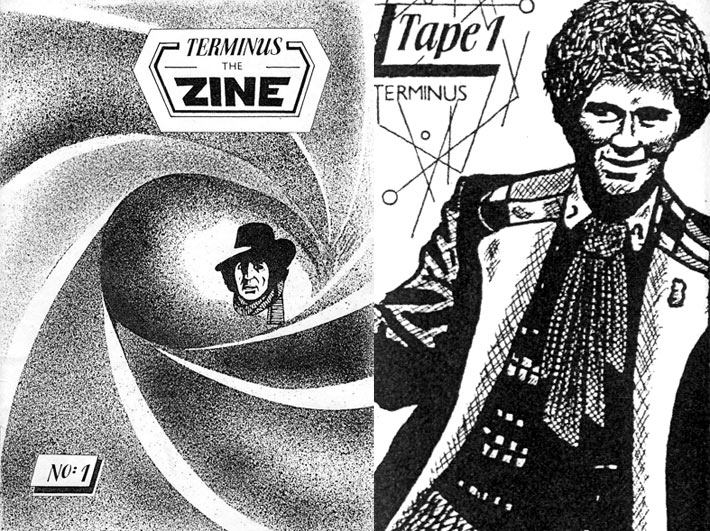
Image © Robert Skinner, 1985
|
The Basics |
|
Place of Origin:
Plymouth, Devon, UK
Editors:
Duncan Skinner and Julian Burt
In
Production:
1985-86 |
Distribution Media:
Audio Cassette / Print
Tape Lengths:
#1 and Winter Special: C-90
Issues Produced:
2 |

Debuting in July 1985 as a
combined audio cassette and printed fanzine, Terminus was billed
as “a revolutionary new fanzine: part tape, part book. Something totally
new in Doctor Who fandom.” This claim was not entirely accurate,
since Terminus arrived more than two years after
Vortex – A History of UNIT
had pioneered this dual format approach, and several months after
Renegade and, less obviously,
Time Listener had also
adopted it. This is not stated in order to denigrate Terminus,
which was a lively and engaging publication, but rather to illustrate
that when fans were producing a new tapezine – or indeed fanzine – they
were not always aware of what had gone before. In the case of
Terminus, its co-editors Julian ‘Jules’ Burt and Duncan Skinner had
heard several tapezines – “UNIT
Tapezine was always my favourite,” says Jules – but the pair had
clearly not encountered the dual format titles.
Jules and Duncan’s
friendship dates back to secondary school and still endures to this day.
“We met in the second year at Eggbuckland Comprehensive School,” Jules
explains. “We were about 12 or 13 years old. Although in different
classes, we found each other and became friends through our mutual love
of all things science fiction. I’d been into Doctor Who from as
far back as I can remember. I recall seeing The Time Warrior and
Planet of the Spiders quite clearly. After that, I was hooked.
Season 12 was the point at which I knew this was amongst the best TV I’d
ever seen.”
Duncan was drawn to the
series at much the same time: “I remember coming in at the end of
Planet of the Spiders, just before Pertwee regenerated – it was the
omnibus repeat, right before Robot. My memories up to that point
are very hazy as I would have been four or five years old then. I
remember a few shadowy images pre-Planet of the Spiders, but it
was with Robot onwards that I was properly there. The scare
factor was a huge part of the appeal for me – and it really was scary.
As a kid, that kept me going back for more. It’s been a lifelong love
affair for me. I’ve got a million religions – Doctor Who, Star
Trek, Blake’s 7, Sapphire and Steel, The Prisoner,
Hammer movies, Bond, Batman – a billion things, but Doctor Who’s
the big one. Yeah, I live and breathe it.”
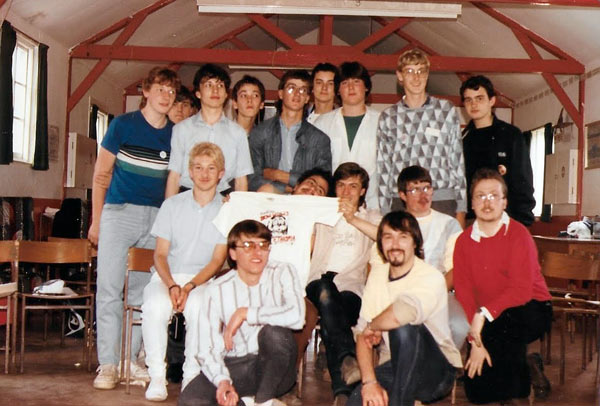
A gathering of the Plymouth DWAS Local Group in 1985
Image © Jules Burt, 1985
Having joined the Doctor Who
Appreciation Society and noted the proliferation of local groups all
over the United Kingdom, Jules endeavoured to start one for fans living
in his own locality: “I started the Plymouth DWAS Local Group in early
1984. We advertised in a local bookshop that always had the new Target
paperbacks out a week or two early, and also in the February 1984
Celestial Toyroom. We used to meet up about once a fortnight and
were fortunate to have a few contacts back then who supplied us with old
stories on VHS tape, years before they were released officially.”
Interestingly, that February
1984 issue of Celestial Toyroom also carried a classified ‘Swap
Shop’ advertisement by Jules which, in addition to the usual offer to
trade Doctor Who memorabilia, asked for contributions to his
forthcoming fanzine Terminus – nearly 18 months prior to the
title’s actual debut – suggesting that initially it was to be a printed
magazine. This led to contributors such as Miles Booy and Steven Jessup
writing for the first issue, though, in both cases, their submissions
were read out by Duncan and Jules and were somewhat out of date by the
time they were heard.
During the early days of its
development, Duncan and Jules had discussed what their publication
should be called. “The trend was to name fanzines after stories – you’d
go for what was current, and what hadn’t been used yet,” Duncan points
out. “I remember Jules saying that Terminus wasn’t a great title
as it wasn’t a great story. Well, at some point, I suggested Frontios,
but I think we both agreed that Terminus sounded better as it
starts with a hard ‘T’ rather than a soft and fluffy ‘F’ – though
Frontios is a great title for Frontios, which is a great
story.”
As Terminus began to take
shape, the decision was taken to split the publication into two parts,
with an audio cassette accompanying the printed fanzine. Why? “It just
seemed like a good idea at the time,” says Duncan. Jules elaborates: “I
loved listening to audiobooks and missing Doctor Who stories on bootleg
cassettes. I would buy almost all the tapezines I saw advertised in Celestial Toyroom, and thought it would be fun to do our own.”
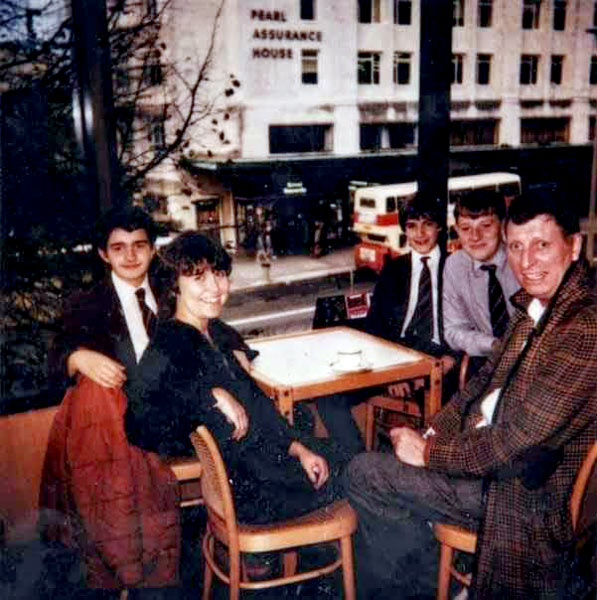
A momentous encounter that would prove to beneficial
for Terminus
Image © Jules Burt, 1985
It seems likely, however,
that the decision to incorporate an audio element into Terminus
was due to a remarkable opportunity that presented itself in October
1984. The Fourth Doctor himself, Tom Baker, was then touring in Oliver
Goldsmith’s She Stoops to Conquer, and Plymouth’s Theatre Royal
was on the itinerary – and an interview was arranged. “It all came about
as Duncan’s mother was the general manager of the local free paper,
The Plymouth Star. They arranged the interview through the theatre,”
Jules explains. “It was very exciting to meet our childhood hero. The
interview is a revelation, recorded less than a year after The Five
Doctors. Tom seemed a bit bitter about the whole affair, but was
incredibly kind to us. We saw She Stoops to Conquer the next day
with the local DWAS group, where once again we mobbed him and he signed
stacks of stuff for us all.”
Duncan also remembers the
occasion with a great deal of affection: “Bill Anderson, the editor of
The Plymouth Star, arranged the interview for us and took part in
it, publishing a photo and short feature in the newspaper. It wasn’t
daunting beyond the whole thing of ‘Oh, wow, here he is, looming over
us!’ Tom came up the corridor, booming, ‘Are you with Bill Anderson?’
and then we went upstairs with him. We sat around drinking orange juice
and did the interview. We weren’t like gibbering nervous wrecks or
anything. It was brilliant. He at no point talked down to us like we
were kids, even when – at the age of fourteen – I said, ‘Do you remember
any really bad mistakes that were made during filming?’ There was this
pause that went on forever... and then he eventually came out with, ‘You
know, you chaps are completely corrupted by watching chat shows, aren’t
you?’ ” The interview formed an important part of the first Terminus
audio cassette, and the Plymouth Star press coverage and
photographs from He Stoops to Conquer were reproduced in the
Terminus print supplement.
The first issue also
included an interview with Peter McGowan, an actor who had featured in
an uncredited role as a UNIT marksman in The Green Death (1973).
“Peter was in a play at the Theatre Royal, which is where I interviewed
him,” says Duncan. “As a 14-year-old, I was in a play – Kes by
Barry Hines, along with a bunch of other kids – so I was hanging about
the theatre. It must have been a play that I went to see as Peter wasn’t
in our play. His Doctor Who role must have been mentioned in his
actor’s biography in the play’s programme. It was pre-internet, and the
VHS release of The Green Death was still years away, but I would
have seen that and realised I had to organise something. It was fun to
do and Peter’s now part of my Facebook network.”

Specially designed labels were added to Terminus
cassettes
Image © Duncan Skinner, 1985
Although Duncan and Jules
were joint editors of Terminus, their responsibilities were split
in line with their specific talents: “Duncan was much more artistic than
me, so he laid the magazine out and did almost all the artwork. I
supplied the stills and bits of other text.” Duncan concurs: “Our input
was probably 50/50 on the tapezine. All the mucking around and the silly
jokes, that was mainly me. The print supplement was mostly me. My
brother Robert got involved there as well. I remember him doing a
squeaky American accent, trying to be Nicola Bryant, during a funny sex
scene, with me doing the Cyberleader’s voice whilst speaking into a big
plastic tube – the sort of thing you put rolled up posters in.” Duncan’s
artistic leanings also led to Terminus including custom-printed
cassette labels, a feature that is believed to be unique to this
tapezine.
Bar the interviews, the
audio component of Terminus was recorded on basic equipment in
the editors’ homes. “Interviews were done with a small recorder and a
little lapel microphone – stuff that was just lying around,” says
Duncan. “I had a tape-to-tape deck – a boombox or ‘ghetto blaster’ to
use Q’s vernacular – so it was just tape-to-tape in real time. We
recorded everything on the same machine that we dubbed copies on. I
don’t think if we had a faster way of doing it we would have found the
time to record new material. The intention was there, but it just fell
by the by.”
The print supplement –
entitled Terminus: The Zine and printed on the school photocopier
– ran to 20 A5-sized pages and, aside from a track- and credit-listing
pertaining to the cassette, was devoted entirely to visual material.
Notable among these are Duncan’s single-page cartoons and his
eyecatching comic strip, Servant of Darkness Part 1, which was
never concluded. “It was terrible,” admits Duncan. “That was me just
making it all up as I went along. I was just an infantile 14-year-old
copying the likenesses from other, brilliant artists, and trying to do
something with it, without an actual script. I was just putting stuff
down as I thought of it. It was garbage! It may have looked okay, but it
went nowhere.”
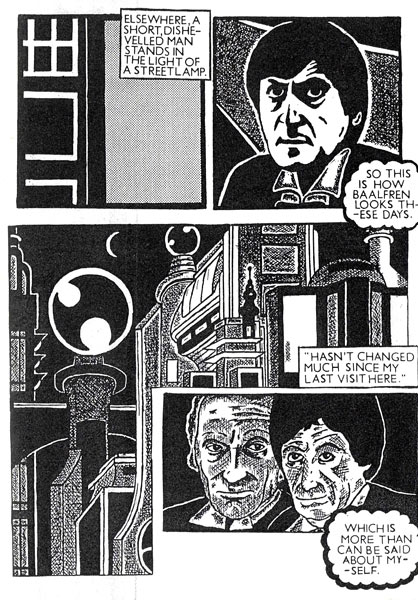
A page from Duncan's Servant of Darkness comic
strip
Image © Duncan Skinner, 1985
Advertised in the July 1985
Celestial Toyroom, Terminus Issue 1 sold respectably. “I
seem to remember it sold really well, maybe 50 copies. Having the Tom
Baker interview probably helped,” Jules suggests. Duncan, meanwhile,
thought that the editorial approach went down well with listeners. “For
something that was brand new and untested, it didn’t do badly. I think
people who bought it actually enjoyed it. I think they liked the fact
that we weren’t taking it too seriously.”
The first issue was followed
up with the cassette-only Winter Special 1985, comprising an
interview with actor Richard Franklin conducted at a local group meeting
in Eggbuckland, with proceeds from the tapezine going to the Franklin’s
Bow-Wows Ethiopia charity. The decision not to include a print
supplement with this cassette was influenced by two factors, as Duncan
explains: “This was because it was a special – and also because there
wasn’t anything ready, so we thought, ‘Let’s just put this out on its
own.’ If Issue 2 had ever come out, there would have been the print
supplement with it.”
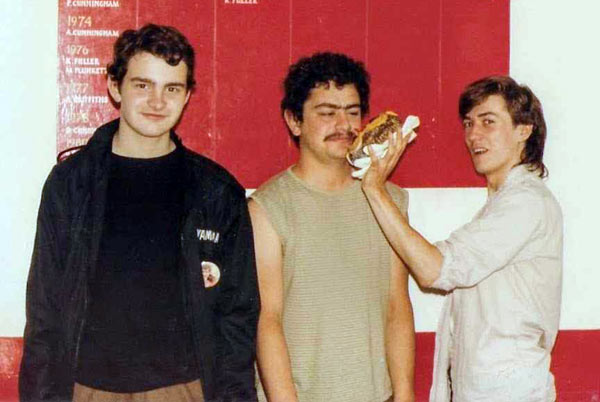
Duncan Skinner, Pete Pearce and John Causey fool about at the
Richard Franklin event
Image © Jules Burt, 1985
The Richard Franklin
interview had come about when the Plymouth and Exeter DWAS local groups
hooked up to invite the actor to a meeting. “I think Jules and someone
else got in touch with Richard and arranged for him to come down to
Austin Farm Primary School in Eggbuckland, where I went to primary
school,” comments Duncan. “It’s got these prefabricated buildings where
the infant classes, the first two years – very young kids – were taught.
A school friend tells me the huts are still there. So, Richard came down
with a friend of his and did his Franklin’s Bow-Wows thing. There was a
good crowd of us there – people from two local DWAS groups – and it was
just like a forum. He did his entertainment thing and then took
questions from the audience. It was good fun. A good day.”
The day’s events were not
restricted to the manic swinging of toy dogs, the singing of kids’
songs, or interrogations about the UNIT era. Indeed, an impromptu
sporting event took place, as Jules recalls: “The Exeter group were
slightly older than us and had been around a bit longer. We played a
game of football. Duncan was definitely there on that memorable day. How
could I forget it? I was definitely not offside! It was a great day.”
In the most bizarre and
amusing send-off for any tapezine, Terminus advertised a very
special product in the October 1986 edition of Celestial Toyroom.
“I made a little gag about a Michael Grade handkerchief whilst talking
to Richard Franklin at the local group meeting in the school hut, but I
had it in mind to do it – and I did do it,” Duncan reveals. “I just
sketched a picture with a biro, copying a photograph of Michael Grade,
and put it together with some dry transfer lettering. It said, ‘The
Michael Grade Handkerchief – Blow Your Nose on the Man That Cancelled
Dr. Who’. My father’s lodger did the printing for me. We bought a load
of handkerchiefs – seconds, a batch that had some sort of flaw or
whatever – and printed about fifty. I sold a handful, but then I was
just using up the handkerchiefs for years. I don’t have any of them
anymore – they’ve gone the way of all snotty handkerchiefs – but Michael
Grade had six of them, because it occurred to me that I should get
permission, not that he would have sued a schoolkid. At some point, I
got a call from his assistant, who said, ‘Go ahead, and he wants six,’
so I sent him six handkerchiefs. I got a letter back that said, ‘Thanks
for the handkerchiefs, I will keep them safe or give them to friends,’
or something like that. It was a very short letter. But that’s a fun
fact – I sent Michael Grade six of those handkerchiefs. I’m sure he gave
them all away, or maybe kept one, relishing his role as the ‘Boo-Hiss’
villain that did for Doctor Who.”
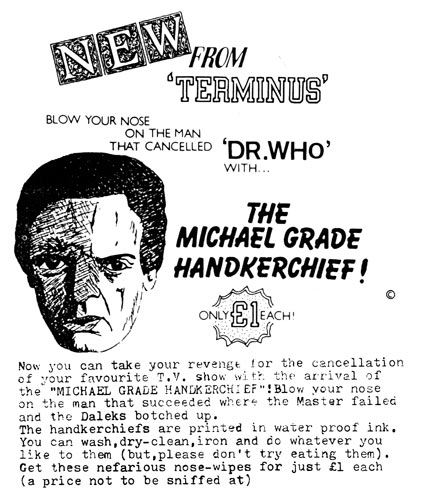
The ultimate Doctor Who accessory. You know you
want one.
Image © Duncan Skinner, 1986
And so, Terminus drew
to a close in a memorable, if wildly unexpected, fashion. There had been
plans for a second issue, but as Duncan recalls, “Life just got in the
way. We were going to continue. I was gathering stuff together for a
second issue, but it never happened.”
Looking back, both editors
are positive about what they achieved with Terminus, even if they
perhaps underrate some of their work on it. “We had a great time putting
it together,” recalls Jules, a sentiment echoed by Duncan: “Of course I
remember those times fondly. A lot of what was in the printed thing was
just me throwing stuff together, thinking I was doing something awesome.
Beyond that, we were just mucking around, being silly and doing silly
voices and making jokes and messing around, which was great. We were
having a blast!”

The highlight of the two
Terminus issues has to be the Tom Baker interview in Issue 1. This
was conducted in October 1984 by Julian Burt, Duncan Skinner, Martin
Pook and Bill Anderson, editor of the Plymouth Star, during the
run of She Stoops to Conquer at the Theatre Royal, Plymouth.
Baker was on good form: “I got started in acting thanks to the Germans
bombing Liverpool during the war, which kept me away from school – and
because we were away from school, we were encouraged to entertain
ourselves. That’s how I got started as an actor, as a boy – I was very
small. As for Doctor Who, that was just another accident. I was
out of work, the job was empty, and I had written an indignant letter –
not to ask to do that – and the letter went to a feller who had just
come away from a casting session. At that time, there was a picture out
that I’d done, I think called The Golden Voyage of Sinbad, which
was a special effects picture directed by Ray Harryhausen, and this
feller that had been to the casting session went to see this film and
proposed me. By the time they’d [all gone] to see that film and rang me
back, they had decided that if I really wanted to do that job, then they
would give it to me. [The costume I came to wear as the Doctor was]
designed by an amazing young man called Jim Acheson, who then went on to
do films, and that came along by accident, again. We just went out to
play. We used to try on clothes before he drew any pictures. In the
ordinary way, a designer has an idea and they draw pictures and make up
the clothes, but we had enough time to go out together – to get to know
each other – and we used to go out and get dressed up in all sorts of
costume departments of the BBC, or Morris Angel, or places like that,
and gradually a sort of figure began to emerge – and then we decided to
have a scarf. Jim had seen a man in a pub with a scarf in those colours
– the original colours, just an ordinary woollen scarf – and he wrote
down that colour scheme. We bought some wool and gave it to a woman
called Begonia Pope, who had never worked for the BBC before but she was
famous as a knitter. We knew nothing about knitting, and when we went to
pick up the scarf, we’d bought too much wool, and she’d knitted it all
up – and this scarf went right across the room! And that’s how it
happened – it was all an accident.”
Asked if he enjoyed working
with the Doctor Who team, his reply was quintessentially Tom
Baker: “Yes, as long as they agreed with me, I adored working with them,
yeah. I adore people who agree with me, don’t you? I can’t stand people
who disagree with me, but if they did what I wanted them to do, I adored
them, and if they forced me to do what they wanted to do, I hated them.
A bit like family life, really – sometimes it was good, sometimes it was
bad!”
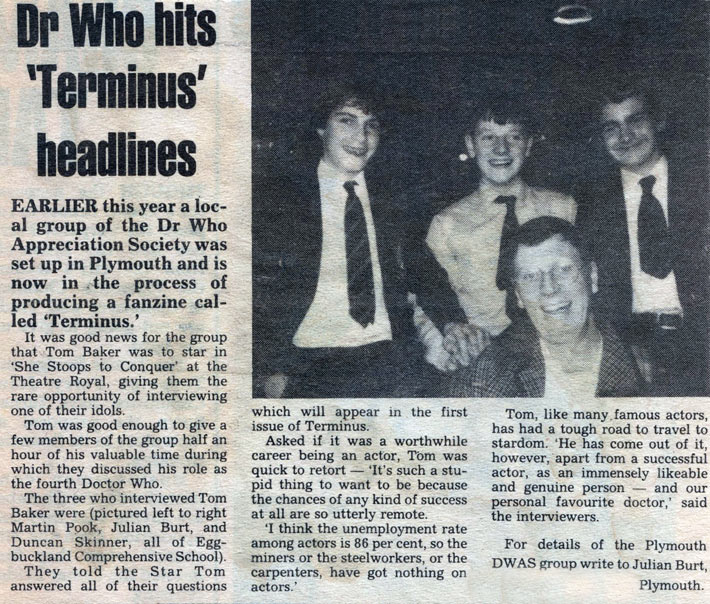
The Plymouth Star newspaper report from October
1985.
Image © Star Newspapers (Plymouth), 1985
Tom went on to reveal his
opinions about a much-loved element of the series: “I was very bored
with UNIT and maybe I influenced [its] annihilation. I thought all those
realistic soldiers, running around firing guns, were very tedious.
Indeed, I often complained bitterly that the resolution of stories in
Doctor Who used to exhaust me, since they were nearly always
resolved with explosions. I find that incredibly tedious – that’s how
you resolve things in this world. If you’re thinking of this person from
another galaxy, travelling the entire galaxy, it seemed to me that there
wasn’t enough difference between the Earth and those other planets we
were on. Always blowing things up! It wasn’t strange enough. It would
have been much funnier to turn the villains into, say, cockroaches. That
strikes me as being really neat, instead of blowing them up. And then
what happens is they’re all scuttling along the street, and you can hear
them with the wonderful equipment you’ve got – and some terrible, casual
people come walking down the street [and crush them]. I think that would
be fun – the children would like that.”
Finally, Baker was asked
what tips he had for prospective actors: “None at all. I would have
thought that anyone who’s silly enough to want to become an actor
wouldn’t take tips anyway because when you want to do something like
wanting to become an actor, you’re not really being rational, are you?
It’s such a stupid thing to want to be, because the chances of any kind
of success at all are so utterly remote. I think the unemployment rate
among actors is 86 per cent, so the miners, or the steelworkers, or the
carpenters, have got nothing on actors. 86 per cent are out of work, so
your chances of earning a living as an actor are nearly zero, even if
you’re very good – maybe especially if you’re very good, because the
factors that go into being successful have often got very little to do
with whether you’re good or not. So, I’d say nothing – but if anyone
insisted on me saying something, I’d just say, ‘You’re mad. And if
you’re mad, you don’t need tips.’ You can’t advise mad people, can you?”
Actor Peter McGowan, who was
cast in Doctor Who in a background role, was also interviewed for
the first issue: “My agent got a phone call about the series they were
doing – it was called The Green Death. Jon Pertwee was Doctor Who
at the time and I was cast as an army marksman – one of the UNIT group.
We were in Wales, near a coal mine. It was a speaking part but it was
only a couple of scenes. It was at the point where there were giant
maggots who were running along the ground and a couple of us who were
marksmen were called in to try and shoot them – and of course all the
bullets bounced off because they were armour-plated. Great big things.
[There was one thing that went wrong.] The Brigadier told me to let off
a dozen rounds at the particular maggot I was shooting at – and I fired
13 times instead of 12. When I stopped, we all had a laugh. It was a
self-loading rifle – rapid fire – but otherwise it was quite
straightforward. [The other actors were] fine, a very friendly bunch.
The regular people like the Sergeant and the Brigadier and Jon Pertwee
himself were great fun. We had lots of fun off the set and we used to go
to the pub together. [I still watch Doctor Who.] Peter Davison,
the present Doctor, is a mate of mine. I worked with his wife, Sandra
Dickinson, in a theatre production in Birmingham – and I met him there.
He’s a nice chap.”

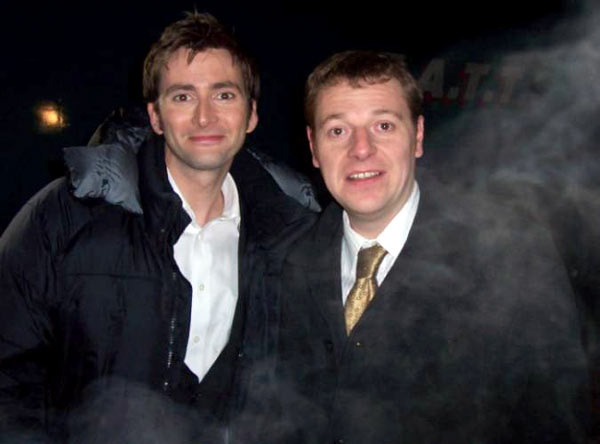
Jules with David Tennant while filming Rise of the
Cybermen, November 2005.
Image © Jules Burt, 2005
Jules Burt has been a
collector of vintage paperbacks, amongst other things, for over thirty
years. In his lifetime, he has owned and run a comic, book and record
store, Purple Haze, been a book shop manager and book buyer for a
national UK chain as well as, when time allows, doing a bit of acting,
including an appearance in a David Tennant Doctor Who, Rise of
the Cybermen, in which he was zapped by a Cyberman – an experience
which he ranks even more highly than interviewing Tom Baker for
Terminus! Jules has written for many magazines and books in his time
but now concentrates his efforts on
YouTube,
where he shares his many passions and collections with a wider audience.
His videos have now surpassed 4.5 million views, with a 25,000
subscriber base. You can also find Jules on
Twitter/X
and Instagram.
Duncan Skinner is a
British actor, writer, producer and voiceover artist living in Athens,
Greece. He is known for numerous Greek feature films including Smyrna
(2021), Adults in the Room (2019), God Loves Caviar
(2012), Emma Blue (2008), for which he was nominated in the Best
Supporting Actor category at the Maverick Movie Awards, and The Light
Touch (2021), which gained him the Best Comedy Actor award at the
Gelos Comedy Film Festival in Moscow. He is also involved as writer,
performer and director of
Bunny Poo Salad,
a British sketch comedy show made in Greece.

In producing Terminus,
Duncan Skinner and Jules Burt struck a good balance between intelligent
content and humour. Their on-tape banter is amusing and endearing, and
it’s fun to hear them break off from presenting their articles to
enquire after the other’s opinions. Gradually, the style morphs towards
discussion, and this proves to be very effective. Likewise, it’s
enjoyable when Duncan slyly changes the backing music to get a reaction
from Jules – Anything Goes, indeed! Don’t worry, though, as the
listeners “won’t notice the difference!” or that it has nothing to do
with Doctor Who. The dual format approach works well, with the
audio and print parts of Terminus showing a clear division of
content – articles, reviews and humour on the tape, and comic strips,
cartoons, photographs and artwork on the printed page. The audio
interviews with Tom Baker, Richard Franklin and Peter McGowan are the
icing on the cake – and, as an aside, it’s odd that McGowan remains
uncredited in Doctor Who production histories to this day. Many
years after it was produced, Terminus remains a well put together
and wonderfully entertaining experience which affords the listener /
reader a fascinating peek into 1980s fandom.
Alan Hayes

|
TERMINUS – ISSUE 1
(Tapezine with A5 Print Supplement)
July 1985, C-90
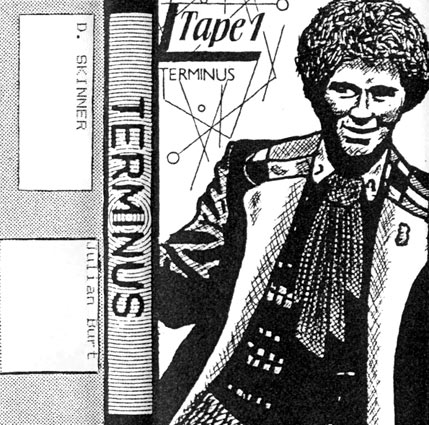
Side
A:
-
Introduction by Duncan Skinner
-
Review: Season 21 by Miles Booy, read by Duncan Skinner
-
Review: Attack of the Cybermen by Duncan Skinner
-
Review: Vengeance on Varos by Julian Burt with Duncan
Skinner
-
Review: The Mark of the Rani by Duncan Skinner and Julian
Burt
-
Review: The Two Doctors by Duncan Skinner and Julian Burt
-
Review: Timelash by Duncan Skinner and Julian Burt
-
Review: Revelation of the Daleks by Duncan Skinner and
Julian Burt
-
Humour: Peri and the Cybermen End Side 1
Side
B:
-
Side 2
Introduction by Duncan Skinner and Julian Burt
-
Convention Review: Aggie-Con 2 by Steven Jessup, read by Julian
Burt
-
Convention Review: WhoCon 21 by Julian Burt
-
Book
Review: US Imprint of Day of the Daleks by Duncan Skinner
-
Excerpt: The Dalek Invasion of Earth Episode 4: The End
of Tomorrow
-
Interview: Peter McGowan (UNIT Marksman, The Green Death)
by Duncan Skinner
-
Interview: Tom Baker talks to Julian Burt, Duncan Skinner, Martin
Pook and Bill Anderson, editor of The Plymouth Star
-
Terminus 1 Sign Off by Duncan Skinner and Julian Burt
TERMINUS – WINTER SPECIAL 1985:
THE RICHARD FRANKLIN INTERVIEW
January 1986, C-90
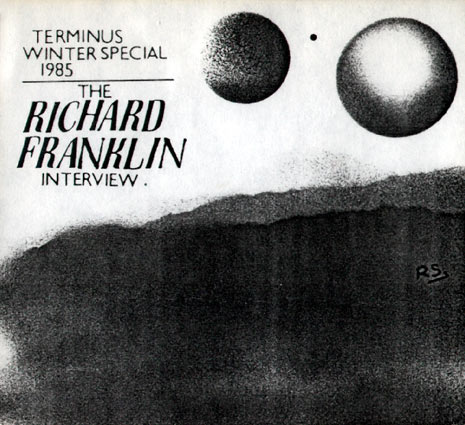
Side
A:
-
Introduction by Duncan Skinner
-
Music: Daddy Wouldn’t Buy Me A Bow-Wow by Richard Franklin
-
Interview: Richard Franklin, talks to the Plymouth and Exeter
Doctor Who Local Group
Side
B:
-
Interview: Richard Franklin (continued)
-
Music:
Has Anybody Seen My Dog? by Richard Franklin
|
|



